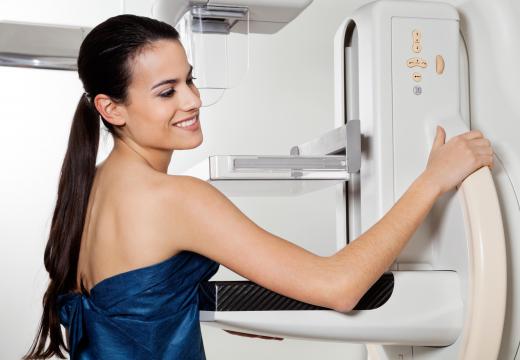What is Biomedical Engineering?
 Mary McMahon
Mary McMahon
Biomedical engineering is a scientific discipline which brings the principles of engineering to biology and medical treatment. Engineers are world-famous for coming up with innovative approaches to problems, and they are fond of saying that no problem is too large for an engineer. Turning this can-do attitude to the field of medicine, biomedical engineers work on a wide variety of things, from artificial hearts to cultured skin grafts, in the hopes of advancing medical treatment.
People who wish to study biomedical engineering must pursue training in both engineering and biology. Many universities have biomedical engineering departments to meet the need for new biomedical engineers and the growing interest in this field, and students typically pursue doctoral degrees in this field so that they can learn as much as possible.

A wide variety of things fall under the purview of biomedical engineering. Most new medical devices, for example, are constructed by people in this field, including things like equipment used in medical treatment, medical imaging systems, artificial organs, prosthetic limbs, and hearing aids. The ability to develop new medical devices is a critical aspect of biomedical engineering, with researchers also working on things like biocompatible materials so that the body will not reject implants, along with advanced prosthetics which can interface with the brain and nervous system.

Biomedical engineers also work in the field of genetics, researching the human genome and looking into the possibility of growing organs and skin for grafts and transplant, and they research pharmaceuticals, life support systems, and even cosmetic surgery. Biomedical engineering has brought about better artificial hip joints, improved breast implants, and new technology for everything from bone grafts to blood drawing equipment.

The field of biomedical engineering has contributed immensely to medical science since the 20th century, when biomedical engineers began to formally organize themselves and commit to working on problems which faced the medical community. Today, biomedical engineers can be found working for private companies, cooperating in labs with other medical researchers, performing research for the government, teaching new generations in their field, and working with non-profits to develop low-cost medical solutions for the developing world.

This field is constantly expanding, and generally, someone with a degree in biomedical engineering will have no trouble getting a job. A number of trade and professional organizations for biomedical engineers hold annual conferences and continuing education seminars for people to hone their skills in the field and connect with each other.
AS FEATURED ON:
AS FEATURED ON:
















Discussion Comments
@David09 - I’m so glad that we are living in an age of interdisciplinary studies, bioengineering being one of them.
Medicine, technology and engineering can converge in so many ways. It’s opened up new pathways for people who have had eclectic interests.
Now, if you like medicine but have also had a penchant for engineering or physics, there is a new field of study for you in bioengineering.
@allenJo - It's good that at least he now has options, whether to use an implant or an aid. In either case, we can thank the field of bioengineering for this.
I think everyone's first exposure to biomedical engineering technology was good old Steve Austin, the Six Million Dollar man. That’s when the term “bionics” entered our vocabulary. Back then it seemed like only so much fiction, but I am pleased that a lot of it has turned into reality.
I think it’s great that medical science has come to the place where it can offer things like artificial limbs to people who have lost their natural limbs in some calamity like war. Bioengineering gives them a chance to keep going on and hopefully resume a normal life once again.
On the radio I keep hearing this commercial for a new kind of hearing aid, one which is implanted and actually improves your hearing rather than simply “boosts the volume,” so to speak, which is what traditional hearing aids do.
I don’t have a need for it myself, but I was thinking of buying it for my father, who has been wearing hearing aids for quite some time. The only problem, as stated, is that it is an implant, and I don’t know if he would be that open to having an implant.
He has grown rather used to the convenience of simply having an aid that he can remove as he needs to.
Post your comments